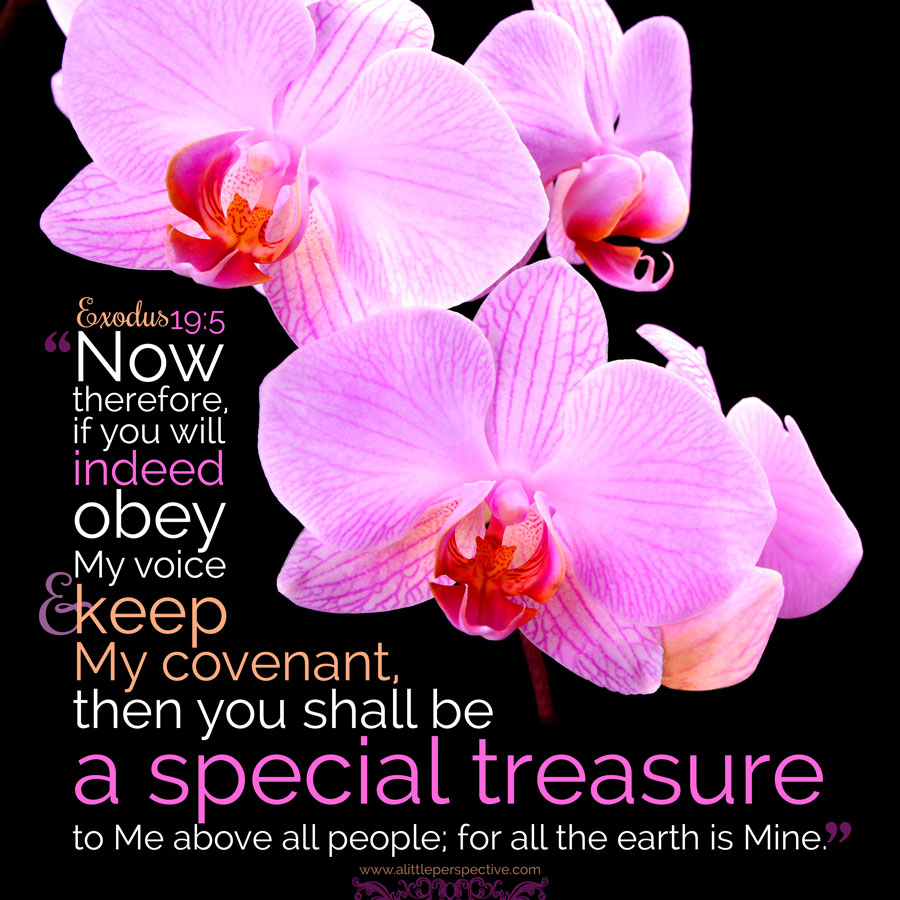Read Exodus 19 at Bible Gateway.
Hebrew paragraph division
Exo 19:1-25 YHVH descended upon Sinai in fire, to enact the marriage covenant with Israel
Hebrew roots
Now therefore, if you will indeed hearken to My voice, and keep My covenant, then you shall be My own special treasure from among all peoples; for all the earth is Mine; Exo 19:5
Hearken is Strong’s H8085, shama.
Keep is Strong’s H8104, shamar.
Covenant is Strong’s H1285, beriyth.
Special treasure is Strong’s H5459, segullah, a concrete noun meaning, “jewel, wealth;” according to the Ancient Hebrew Lexicon, the noun is from סגל segul, an unused primitive root meaning, “to shut up.” The ancient pictographs are sin + gimel + lamed.
sin ס = the thorn, thus grab, hate, protect
gimel ג = the foot, thus foot, walk, gather
lamed ל = the shepherd’s staff, thus teach, yoke, to, bind
The story being told is of protecting (sin) that which has been gathered (gimel) and bound together (as a yoke, signified by the staff, lamed, binds a pair of oxen together). Thus “to shut up” would be the same idea as putting valuables in a safe or a vault. To YHVH, we are a segullah, a special treasure, above all the peoples on the face of the earth.
If we keep Him, i.e., keep His covenant, then He keeps us. ♥
“ … and you shall be to Me a kingdom of priests, and a holy nation. These are the words which you shall speak to the children of Israel.” Exo 19:6
Kingdom is Strong’s H4467, mamlakah, a concrete noun meaning, “kingdom;” from Strong’s H4427 מלך malak, a primitive root meaning, “to reign.” The ancient pictographs are mem + lamed + kaph.
mem מ, ם = the water, thus chaos, mighty, blood
lamed ל = the shepherd’s staff, thus teach, yoke, to, bind
kaph כ, ך = the open palm, thus bend, open, allow, tame
The story the ancient pictographs are telling is of the mighty (mem, but may also carry the meaning of a blood line) who use their authority (lamed) to bless (kaph).
Priest is Strong’s H3548, kohen, a concrete noun meaning, “priest;” from Strong’s H3547 כחן kahan, a primitive root meaning, “to presage, to predict.” The ancient pictographs are kaph + chet + nun.
kaph כ, ך = the open palm, thus bend, open, allow, tame
chet ח = the wall, thus outside, divide, half
nun נ, ן = the seed, thus continue, heir, son
The verbal root at the base of this family of words means “to stand” when used as a verb; “root” when used as a concrete noun, since it is the root which allows the plant to stand upright; and “surety” when used as an abstract concept. This is because the opening (kaph) of the seed (nun), i.e., the going down of the root, supports the plant. He who supports, or mediates, stands between (chet) two parties. Thus the chet is in the center or middle position in the three-letter root to indicate standing between.
Holy is Strong’s H6918, qadowsh, an adjective meaning, “holy;” from Strong’s H6942, qadash, to be holy.
And all the people answered together, and said: “All that YHVH has spoken we will do.” And Moses reported the words of the people to YHVH. Exo 19:8
Do is Strong’s H6213 עשה asah, a primitive root meaning, “to do.” The modern three-letter root is ayin + shin + hey. The Ancient Hebrew Lexicon tells us that the shin was transposed from an original sin over time because of their similar sounds. So the original ancient pictographs were ayin + sin + hey.
ayin ע = the eye, thus watch, know, shade
sin ס = the thorn, thus grab, hate, protect
hey ה = man with upraised arms, thus look, reveal, wonder, worship, breath
The story being told is of man’s first work in watching (ayin) for thorns and thistles (sin) which would seek to take over his crops:
“Cursed is the ground for your sake; in toil you shall eat of it all the days of your life. Both thorns and thistles it shall bring forth for you, and you shall eat the herb of the field. In the sweat of your face you shall eat bread till you return to the ground …” Gen 3:17-19
The addition of the hey adds the element that a man is to do with all his might, whatever his hand finds (hey, i.e., pointing out what has been discovered) to do:
Whatever your hand finds to do, do it with your might; for there is no work or device or knowledge or wisdom in the grave where you are going. Ecc 9:10

















Leave a Reply